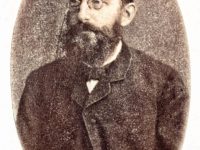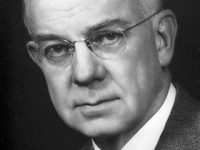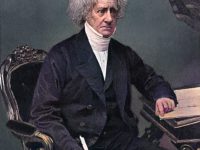
The city of Lviv where Ludwik Fleck was born and completed his medical degree
On July 11, 1898, Polish and Israeli physician Ludwik Fleck was born. Fleck did important work in epidemic typhus in Lwów, Poland, with Rudolf Weigl and in the 1930s developed the concepts of the “Denkstil” (“thought style”) and the “Denkkollektiv” (“thought collective”). The concept of the “thought collective” defined by him is important in the philosophy of science and in logology (the “science of science”), helping to explain how scientific ideas change over time.
“Such stylistic resolution, only singularly possible, is called truth. It is not “relative” or even “subjective” in the popular sense of the word. It is always or almost always, within a style of thinking, completely determined. You can never say the same thought is true for A and false for B. If A and B belong to the same collective of thought, then the thought is either true or false for both. But if they belong to different thought collectives, it is not the same thought, because it must be unclear to one of them or is understood differently by him”.
— Ludwik Fleck [5]
Working in Bacteriology
Ludwik Fleck was born in Lemberg (Lwów in Polish; Lvov in Russian; now L’viv, Ukraine) and grew up in the cultural autonomy of the Austrian province of Galicia. He enrolled at Lviv University where he received his medical degree. He started working as Rudolf Weigl‘s assistant and worked in the department of internal medicine at Lwów General Hospital. Later on, Fleck became director of the bacteriological laboratory at the local social security authority. Starting from 1935, Ludwik Fleck started working at the previously founded bacteriological laboratory.
Deportation and Detention
In 1942, Fleck and his family were deported to the Laokoon pharmaceutical factory to produce a typhus serum since he was known to the German occupiers. They were later sent to the Auschwitz concentration camp where Fleck was to diagnose syphilis, typhus and other illnesses using serological tests. In December 1943 and until the liberation of Poland in 1945, Fleck was detained at Buchenwald concentration camp.
After the War
After the war, Fleck served as head of the Institute of Microbiology of the School of Medicine of Maria Sklodowska-Curie University of Lublin and after that he moved to Warsaw to become the Director of the Department of Microbiology and Immunology at the Mother and Child State Institute.
The Thought Collective
Ludwik Fleck became known for his concept of the thought collective. It is defined as a community of researchers who interact collectively towards the production or elaboration of knowledge using a shared framework of cultural customs and knowledge acquisition. Fleck identified the scientific production of knowledge as primarily a social process that hinges upon prior discoveries and practices in a way that constrains and preconditions new ideas and concepts in his work ‘Entstehung und Entwicklung einer wissenschaftlichen Tatsache; Einführung in die Lehre vom Denkstil und Denkkollektiv‘ (The emergence and development of a scientific fact; introduction to the doctrine of the style and collective of thought).
In it, Fleck describes a ‘truth‘ as a relative value, expressed in the language or symbolism of the thought collective in which it belonged, and subject to the social and temporal structure of this collective. This means that a specific truth is true or false is impossible. It is true in its own collective, but incomprehensible or unverifiable in most others. Fleck came to the conclusion that new scientific insights can not only be developed by accumulating new pieces of information, but also in overthrowing the old ones. Change was especially possible when members of two thought collectives met and cooperated in observing, formulating hypothesis and ideas.
A Pioneer of Historical Epistemology
According to Fleck, a successful epistemology must take into account the historical and social factors by which epistemological criteria are shaped. In connection with this thesis he rejects the formulation of universal criteria of knowledge and is regarded as a pioneer of historical epistemology. Fleck’s philosophical work remained largely unconsidered during his lifetime: In the first twenty years after the publication of his major work, probably less than 500 copies were sold. The newer reception was initiated by Thomas S. Kuhn,[6] who noticed in the preface to The Structure of Scientific Revolutions that Fleck anticipates many “of my own thoughts“.
Emigration to Israel and Death
In 1956, after a heart attack and the discovery that he was suffering from lymphosarcoma, Fleck emigrated to Israel where a position was created for him at the Israel Institute for Biological Research. He died in 1961 at the age of 64 of a second heart attack.
Babette Babich, Calling Science Pseudoscience (Part I), [8]
References and Further Reading:
- [1] Ludwik Fleck Life and Work
- [2] Sady, Wojciech. “Ludwik Fleck”. In Zalta, Edward N. (ed.). Stanford Encyclopedia of Philosophy.
- [3] Wie Stimmungen auf die Dynamik der Erkenntnis wirken
- [4] Ludwik Fleck at Wikidata
- [5] Ludwik Fleck: Entstehung und Entwicklung einer wissenschaftlichen Tatsache. Einführung in die Lehre vom Denkstil und Denkkollektiv. Mit einer Einleitung herausgegeben von Lothar Schäfer und Thomas Schnelle (= suhrkamp taschenbuch wissenschaft. Nr. 312). Suhrkamp, Frankfurt am Main 1980, ISBN 3-518-07912-3, S. 131.
- [6] Thomas S. Kuhn and the Structure of Scientific Revolutions, SciHi Blog
- [7] Fleck, Ludwik (1979). Merton, Robert K. (ed.). Genesis and Development of a Scientific Fact. Translated by Bradley, Fred; Trenn, Thaddeus J. Chicago: University of Chicago Press.
- [8] Babette Babich, Calling Science Pseudoscience (Part I), Babette Babich @ youtube
- [9] Timeline of Historians of Science, via DBpedia and Wikidata





